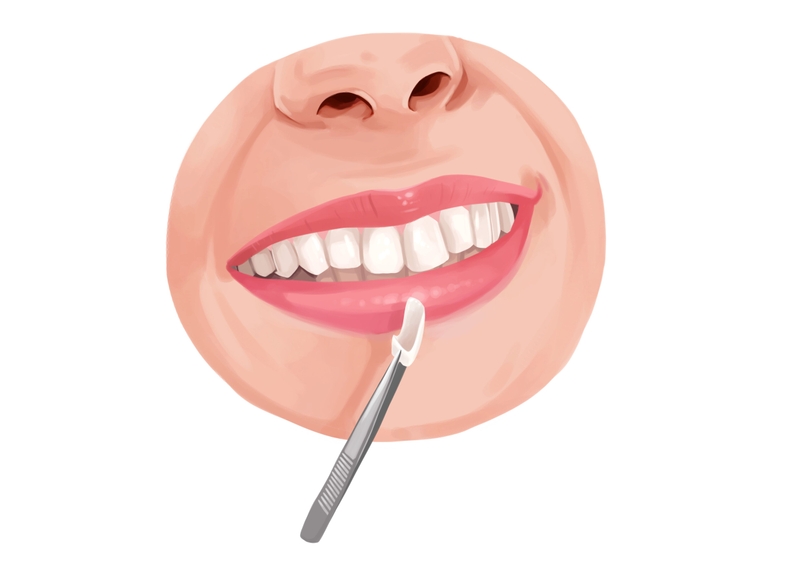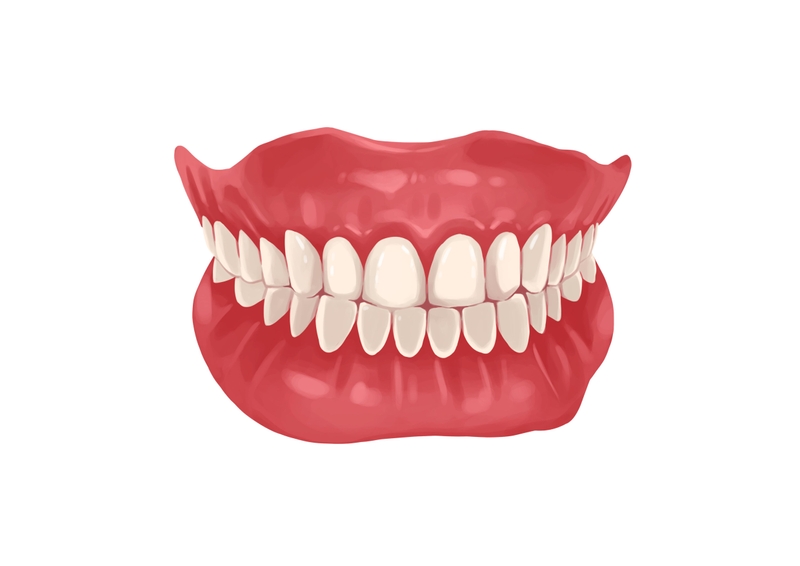- Veneers and dentures are essentially two different types of treatment.
- A veneer is a thin shell of porcelain or resin shell placed on the front part of a tooth. Typically, dentists use them to correct cosmetic problems.
- You can have dentures even when most of your teeth in the dental arch are missing. Their main function is to address the loss of teeth.
Use Authority Dental to book a dentist appointment for dentures, or sign up for a dental discount plan and save up to 60% on all dental procedures, including dentures.
Should you choose dentures or veneers if you want to improve your smile? Here's everything you need to know.
How to compare veneers versus dentures?

Picture by Authority Dental under CC 2.0 license
When comparing the differences between veneers and dentures, you'll need to think about who is a good candidate for each, what the processes are, and what the final result will look like.
Keep your own situation in mind as you review each of these considerations.
Candidate profile
If you are able to restore your natural teeth, veneers are a better option. Dentists do not like to extract teeth unless it is absolutely necessary because the replacement option is not typically as good as your natural teeth. So, if your teeth can be restored with a veneer, crown, or filling, you'd be a better candidate for veneers.
However, if your teeth are beyond repair, dentures are the better solution. Complete dentures replace an entire arch of teeth while partial dentures just replace some of the teeth.
If you are missing all of the teeth within the arch, dentures are your only option. If you still have some remaining teeth, you might also be a candidate for snap-on veneers that would both replace the missing teeth and cover the natural teeth to give you a beautiful smile.
Process
The process to get dental veneers or dentures requires about the same amount of time. A professional dental lab near you can produce both types of fake dentition.
If you're getting veneers, your dentist will need to shape the teeth so that the dentures can fit over top of them. Very little tooth structure needs to be removed and in some cases, it won't have to be removed at all. Once any adjustments have been made, impressions are taken and then sent to the dental laboratory for the veneers to be fabricated. You'll return to the office a few weeks later to have the veneers placed.
If you're getting dentures, you'll also need to have impressions taken. Once the lab has fabricated the dentures, you'll return to try them in. Unlike veneers, you may need to make several trips back to your dentist to adjust the dentures for proper fit. If you are pairing dental implants with your dentures, the entire process will take an additional several months.
Appearance
Veneers will give you a more natural-looking smile than dentures. The reason is that you don't have to replace any of the gum tissue if you get veneers. They will cover the crown portion of your tooth only and will sit right on top of your gum tissue, making them look identical to your natural teeth.
Many dentures have a natural appearance, but some people notice a difference in the gum tissue. Plus, dentures can change the shape of your face over time, leaving you with a sunken facial structure.
The type of material you choose for either option will have an impact on how natural they look.
Veneers are often made of porcelain, which looks similar to your teeth. Composite veneers do not look as good. Dentures are often made of acrylic or composite material, which gives them a more dull or flat appearance of teeth. Porcelain crowns on dentures are a more expensive option, but have a more natural result.
Care
You'll need to take good care of your dentures or veneers. The nice thing about veneers is that you can just brush and floss them as you do your other teeth. You won't need to remove them at night.
Dentures, on the other hand, require more selective care. You'll need to clean your dentures each night and soak them in water or a denture cleanser.
Lifespan
The lifespan for veneers and dentures largely depends on how well you take care of them.
Since your natural teeth are still present with veneers, they can get tooth decay. As long as you practice good oral home care, a permanent veneer can last many years.
Because your bone can change over time, dentures often need replacing every few years - more frequently than veneers do.
Veneers vs. dentures cost

Picture by Authority Dental under CC 2.0 license
Most dentures cost between $1,800 and $4,000 per arch. Implant-retained dentures cost much more.
The cost for one veneer is between $1,000 and $2,000.
If you have dental insurance, your cost will be different. Most dental plans help pay for dentures, but not as many will pay for veneers since they are considered cosmetic dentistry.
Dentures vs veneers: pros and cons summary
There are many pros and cons to dentures and veneers. Dentures are the better option if you need to replace several missing teeth, but veneers are a good alternative if you just want to change the appearance of your existing teeth.
Conventional dentures are easier and often less expensive to replace should you need new ones. However, one of the drawbacks of dentures is that they may not last as long as some veneers. Neither option will stain easily if properly cared for.
Veneers are often the faster treatment, especially because they do not need adjustments once they're placed. Dentures have a longer healing period and recovery time and can take much longer to get used to using.
Dentures can cause dental health problems if not maintained, but they cannot decay like veneers can. Still, you'll need to practice good oral hygiene with either solution.
FAQ
Are veneers better than dentures?
If you are able to keep your natural, healthy teeth, porcelain veneers are better option for people than a removable denture. They can even be used to fix your crooked teeth.
However, if your teeth need to be extracted or you've had extensive tooth loss, dentures are the better treatment option.
Are snap-on veneers good alternative to partial dentures?
As long as your remaining teeth are healthy, snap-on veneers can be a good alternative to partial dentures. Snap-on veneers can act as a replacement tooth or fix the appearance of a real tooth.